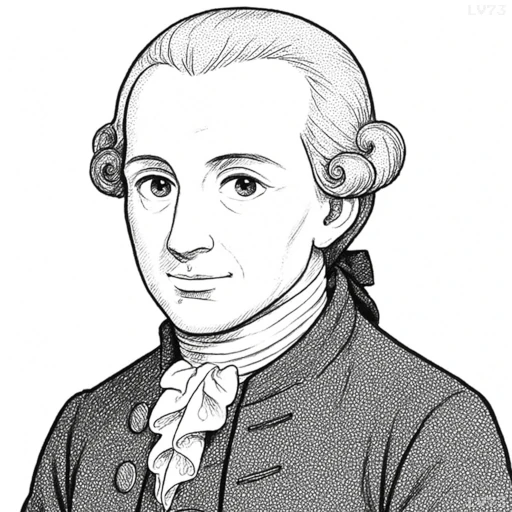“What can I know? What ought I to do? What can I hope?”

- April 22, 1724 – February 12, 1804
- Born in Germany (East Prussia)
- Philosopher
table of contents
Quote
“What can I know? What ought I to do? What can I hope?”
Explanation
This famous triad of questions comes from Immanuel Kant’s critical philosophy, which he explores in his seminal work, Critique of Pure Reason. These three questions outline the fundamental areas of human concern: knowledge, morality, and hope. The first question, “What can I know?”, addresses the limits and scope of human understanding. Kant argues that while we can gain knowledge of the phenomenal world (the world as we experience it), there are limits to what we can truly know, especially when it comes to things that lie beyond human perception, such as the noumenal (the thing-in-itself). The second question, “What ought I to do?”, connects to Kant’s moral philosophy and his concept of the categorical imperative, which suggests that individuals must act according to moral principles that can be universally applied. The third question, “What can I hope?”, speaks to the possibility of a moral order and the future—namely, how individuals can hope for justice, happiness, or fulfillment through moral action.
These questions remain highly relevant in modern philosophical discourse, especially when considering issues such as epistemology (the theory of knowledge), ethics, and the pursuit of meaning in life. In an age where the scope of what we can know is constantly expanding through science and technology, Kant’s insight reminds us to reflect on the limitations of human understanding. In contemporary society, the question of what ought I to do? is deeply connected to modern ethical dilemmas such as environmental responsibility, social justice, and human rights. Kant’s insistence on universal moral duties continues to influence debates about what is right and how we should act in complex, interconnected societies. The final question of hope invites reflection on whether individuals can expect a just outcome for their actions, which resonates with today’s concerns about social, environmental, and political change.
Historically, these three questions highlight Kant’s effort to integrate knowledge, morality, and hope into a cohesive system of thought. His work came at a time when the Enlightenment’s emphasis on reason and human autonomy was challenging traditional views of authority, particularly religious and metaphysical explanations of the world. Kant’s emphasis on the limits of what we can know (epistemology), his framework for moral duty (ethics), and his vision of hope for a just world laid the foundation for much of modern philosophy, especially in areas like moral realism, humanism, and the philosophy of science. Today, his questions continue to inspire thinkers to consider the deep and interconnected nature of human existence and to strive for a more rational, ethical, and hopeful world.
Would you like to share your impressions or related stories about this quote in the comments section?
